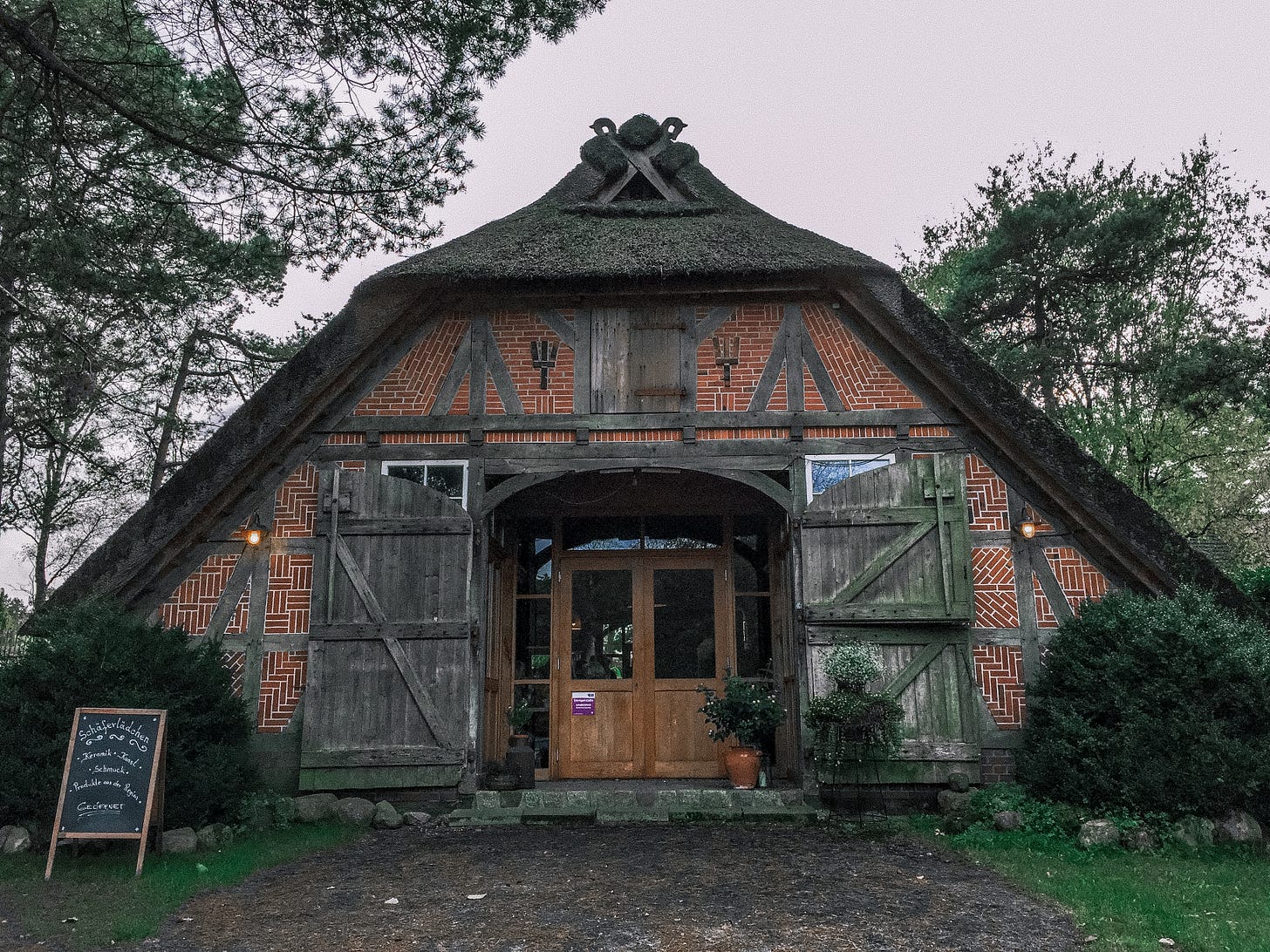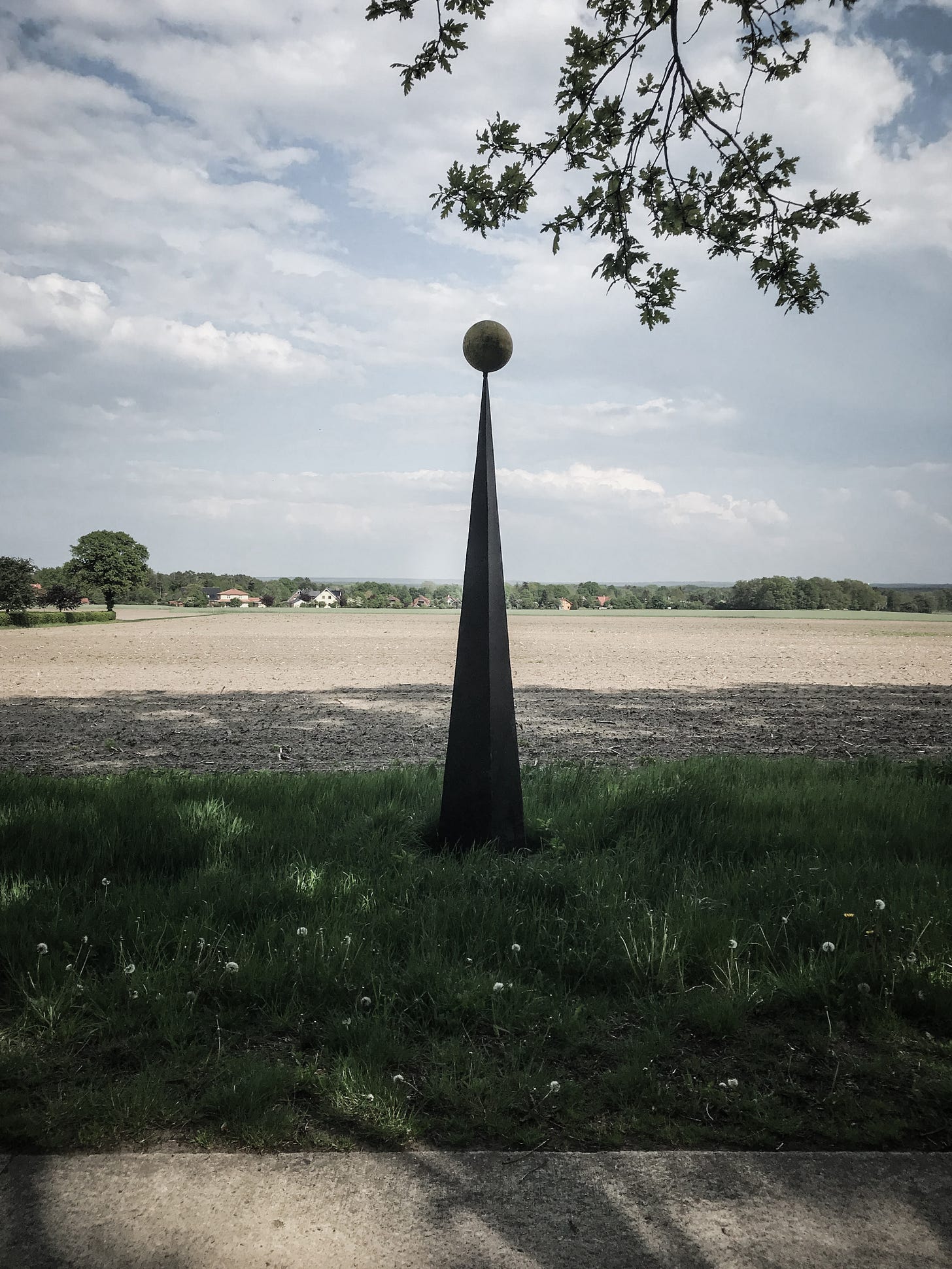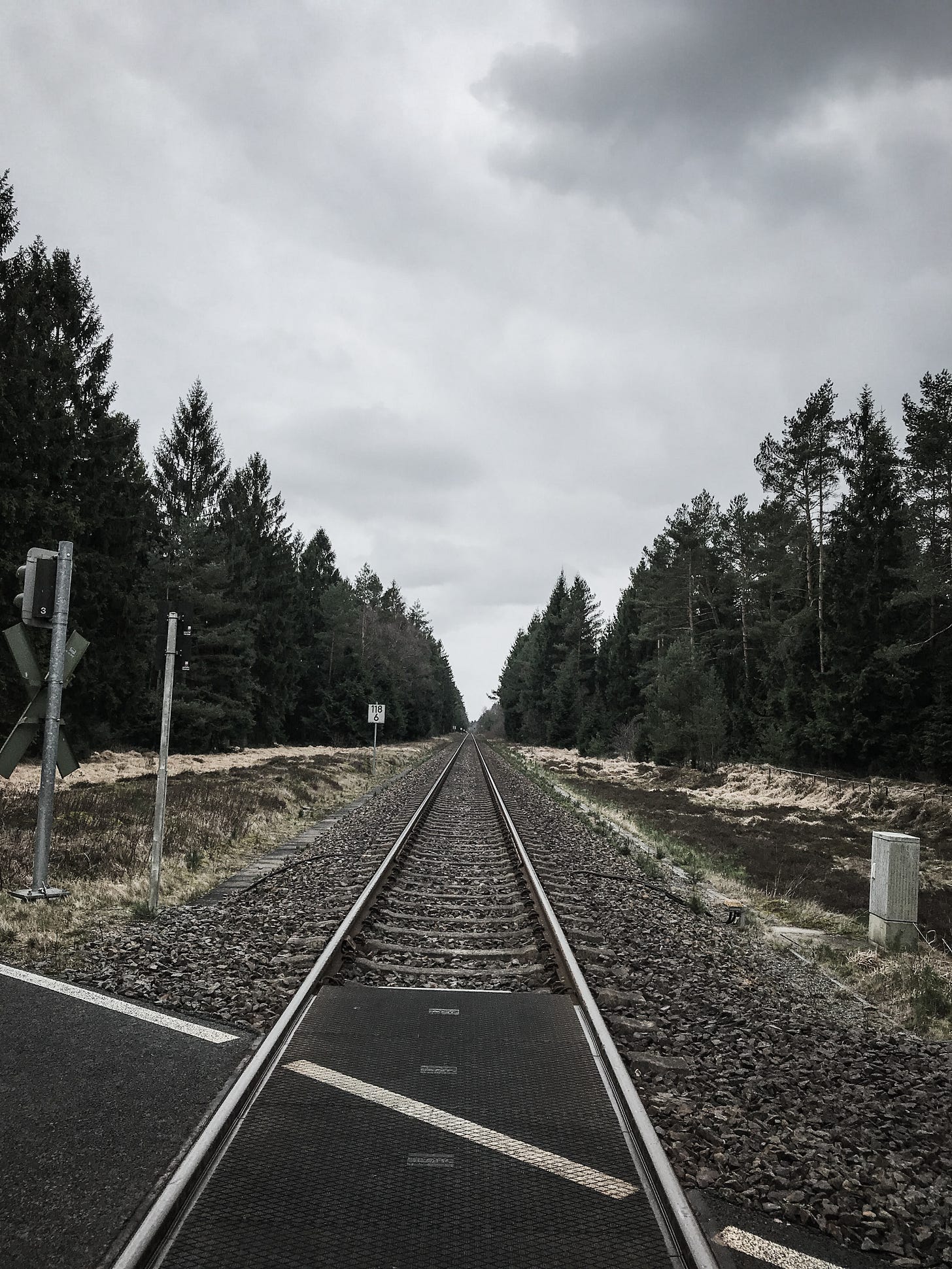you just opened a new edition of enda lettere, a wannabe-regularly published newsletter about landscapes and literature. the year is 2018 and we’ll head out to the heathland, get acquainted with the terms Kaffeekränzchen, Kulturlandschaft, and meet a ghost.
Hamburg’s central station is busy, cold, and highly functional. resisting any attempt of modernization that would lend the vast and yet cramped hall some flair, grandeur even, it is home to a handful of essential shops selling overpriced ware, cafés, and the cool wind that likes to sleep inside the main hall, curling up above the platforms. to arrive here on a night train, bleary-eyed and clueless is a slightly uncomfortable experience—one encounters such lost souls every weekend while queueing for croissants and lackluster coffee, and one cannot remain cold-hearted towards them: they have no idea of the splendid, bourgeois boredom of this city.
so here i am, queueing for croissants and Franzbrötchen, this disfigured love-child of the real croissant and the Swedish cinnamon bun, a Hamburger original. I pocket a Belgian waffle, too, craving something even stickysweeter and international, and i try to hide a permafrown with a stickysweet smile. „thank you and have a lovely weekend,” i’ve perfected the intonation for years to sound sufficiently cheerful.
I'm at the door at a quarter to four
Poppers popping, baby, might take some more
I'm fucking loose, you're gorgeous, I don't care
Come closer, baby, slap me like that snare
earbuds in—to drown out the incessant chatter of excited pensioners embarking on a daytrip and energetic teenagers going through tik tok videos. it is still my job, but i don’t want to know what tik tok is. and i don’t want to witness the pensioners opening a bottle of cheap prosecco 15 minutes later. (and most of all i don’t want to see the ubiquitous, domineering, clean designs of the Ritter Sport banners around the main hall: slabs of chocolate on a neutral background with some incomprehensible tagline that’s meant to be funny—these win some inane grand prix every single year for creativity.)
all i want is to board the train (beautiful, red, silent) that would bring me to a place of stillness, to a place where i can safely set free the frustrated, wounded beast in me. i am somewhat worried, though: it is entirely possible that there will be too many people out there wearing matching softshell jackets and very professional looking running shoes. but the Lüneburg Heath is blissfully vast and empty. there is still hope.
Moon Shaped Pool plays in the velvet cell
Green neon sign reading "Welcome to Hell"
Leather slings fall like oxygen masks
We're going down, fuck my life in half
the train stops at Klecken and i finish my breakfast of stickysweet pastries and coffee. the pensioners just opened their piccolo proseccos. i think of Hans Henny Jahnn who lived nearby with the loves of his life. fuck my life in half, indeed, for it will never measure up to Jahnn’s uncompromising, intense reality, his life more of a work of art than his plays and novels.
there is a cold breeze and with a jolt i realize that Hans Henny Jahnn has just reached for my hand and won’t let me go. Jahnn, another Hamburger original is a largely forgotten author of the 20th century, who set out to reform an entire culture, its ways of living and working, through his utopia: the all-encompassing publishing house, commune, and artistic movement he called Ugrino. he had lived his life in the shadow of what he perceived as perpetual pain and suffering, expressed through his disturbingly violent anti-heroes, men and women reduced to their base biological impulses, perpetually and purposely hurting themselves and their loved ones, and most of all, nature around them.
for me, Jahnn’s figure, his darkness, his light, his brutal honesty is inseparable from roaming the Lüneburg Heath: a defiantly authentic life set against the backdrop of a landscape of nightjars, juniper, coppiced oak trees, and heather becomes intertwined with a deeply personal sense of desolation in my sunday ritual.
School of magic, with brooms and wands
Pairs of people tugging like hungry dogs
For bone, baby, in the house of slithering
Floor full of happy wizards scissoring
Buchholz in der Nordheide is the entrance to rural Germany—or to a peculiar underworld. following along an ever popular hiking path, one gets to the Zwergtunnel (dwarf tunnel), a symbolic ingress beneath the railroad tracks, through which one enters another world: barren, flat, lifeless, and colorless—it must have been a frighteningly alien landscape thousands of years ago, compared to the different types of dense forests, lush pastures, and rich soil that once covered Europe. thin and frizzy short-tail moorland sheep, the Heidschnucke graze here like gangs of devils with jet-black thoughts on their minds.
i routinely return to this leg of the aptly named hiking path, the Heidschnuckenweg in the dead of winter and early spring when my craving for solitude and emptiness contorts itself into pointless anger. the Lüneburg Heath is everything that is wrong with modern German mentality in my eye: over-engineered and touristified, there are but a few corners in this vast expanse where one is really left alone.
Kulturlandschaft (cultural landscape) is one of the few German words i hate with a passion, but nothing describes the Lüneburg Heath more accurately. like so many other German words, it is laden with meaning, a simple translation feels insufficient. Kulturlandschaft is where an effort is made to make agriculture thrive often against all odds, where man succeeded in pervading and disrupting nature’s ways—a subjugated landscape also becomes culturally relevant. it becomes approachable and comprehensible: man creates geography where previously there was none. and man has been tirelessly toiling for 5,000 years in the Lüneburg Heath, with different plans and desired outcomes in mind. the landscape has been marked and marred by ancient tumuli, coppices, oak and pine forests, meager fields, here and there a sheepcote with thatched roof.
there is a sickening variety of theme parks, nature trails, cottage cafés with petting zoos, cheap rural restaurants on the heathland, and a domed ski slope built for the northerners missing their skiing holidays come next March. 1077.92 km2 of gaudy entertainment—even the status of the heather blooming is visualized on a digital map, so that tourists flocking to the Totengrund know when and where to take pictures.
I don't subscribe to your cultural norms
My church's doctrine has lost its charm
Rise above the gloom of the jungle floor
Hit me like that snare, more, more, more
the struggle to leave any and all structures behind makes the whole sunday endeavor so sinfully addictive. i indulge in not trying to reach my stillness point, but observe this pent-up energy as i race towards Schneverdingen. not looking left, not looking right.
sunday is perfect for the traditional Kaffeekränzchen, coffee and cake in good company in the afternoon. there is a cottage nearby, where time had stopped, the fire is roaring in the open fireplace in the empty main hall with the long tables lined up, trays of traditional cakes readied for the guests; there is apple pie, apple with streusel, plum pie, plum pie with streusel, streusel with streusel, Hansel and Gretel’s little fantasy with a dark twist: on cue, a group of fourty elderly ladies and gentlemen will invariably and suddenly appear mid-afternoon. cakes and coffee are for them. they are each other’s good company.
the waffle is still in my pocket—i can avoid the onslaught of weekend-folks and walk on in the cold drizzle. there are other people out there on the wind-swept, sandy heath for a stroll, but their movement lacks joy or purpose. they linger. they dither. a dirty white sky covers the landscape. its grey-on-grey indifference could be my indifference, but its flat, expansive hostility is definitely my hostility. the Lüneburg Heath’s expanse had been historically seen as threatening and practically inhabitable. romanticism brought a turn in its cultural perception, and then a fondness began to grow in artists’ and early conservationists’ hearts for the endless skies, the stunted crops, the blueberries and the heather, unswayed even in the harshest of winds.
this landscape is only comparable with the Asphodel Meadows, or the Fields of Mourning even: these are Lugentes Campi, the elegiac fields hidden by twilight and encircled by a forest of myrtle where those consumed by hard love wander for all eternity. Caeneus, once a boy, now a woman and then turned again in her former form by fate walks here, and Laodamia and the queen Dido—all suffering a fate heroes and heroines of amatory poetry wouldn’t want to imagine for themselves. walking, walking in a distraught manner on colorless fields, under a colorless sky. neither pleasant, nor torturous, their afterlife is that of a festering numbness. several scholars note that the way Vergil describes the fields and their inhabitants defies objectivity within the context of Aeneas’ epic itinerary. the Fields of Mourning are purposely mired in obscurity, as is the form of Dido, whom Aeneas struggles to see through the shadows, like a new moon covered by clouds. like a sun covered by a perpetually dirty white sky; like eternal boredom, Hans Henny Jahnn would add, calling for depths and heights, for incest, mutilation, sodomy on stage.
I don't subscribe to your cultural norms
My church's doctrine has lost its charm
Family matters, I couldn't agree more
This is my family fisting me on the floor
unwittingly, the ghost of Jahnn becomes my Hermes Psychopompos, the dead souls’ guide. i ponder his choices, his exile in Norway and on the island of Bornholm, his loves and his affairs, his “alchemical wedding” to Gottlieb Friedrich Harms and his marriage with Ellinor Philips, an unfathomably deep yet distant friendship. did he hurt them, too? was he hurting?
soon enough i reach a perfectly smooth and straight cycling path which doubles as a nature trail offering a scale model of the solar system complete with interpretation panels and cheap statuettes of the planets. pluto is still featured as a planet, its demotion mentioned nowhere. leaving the outer planets behind, one gets to a picnic spot beneath old pines—a lovely setting for an outdoorsy Kaffeekränzchen, keeping pluto a bit of company, if one chooses to forget that everything about these structures is gratuitous. the cycling path leads nowhere between the fields and a patch of forest, and thus, lonely and superfluous planets await children eager to experience the notion of distance, the vastness of our neighborhood in the universe, our sun a somewhat lopsided ball atop of an obelisk.
Regret my safe word, one to ten in Japanese
At the party, carpet burning my knees
Na na na na na na na na na na na na(Ichi, ni, san, shi, go, roku, nana, hachi, kyu, jyuu)
Ichi, ni, san, go, roku, nana, hachi, kyu, jyuu
Ichi, ni, san, go, roku, nana, hachi, kyu, jyuu
(Nē, sakki no sunea mitai ni aterushi, hoshī? Ji yaa sou suruwa.)
the grass grew tall in the forest. i’ve never seen anybody walking here, ever. here i slow down with a reverent bow. earbuds out. here i lay down what’s rotten in me. standing in the very middle of the woods is like standing in a green cathedral of silence. Hans Henny Jahnn bids me farewell as i cross the railroad tracks.
and i walk on in a pine forest which is completely artificial, built after an imaginary map of manhattan with a strict grid of wide paths: i choose to walk along the 2nd and sit down to rest on the corner of 53rd.
and then, finally, the forest frays away and i am walking across a mauve-on-grey, green-on-grey, grey-on-grey stretch of heath, where the heather had withered. now it rains harder, but blissfully, it washes away nothing, because nothing is left in me. my anger, my sorrow, my pointless agitation: all gone, all left behind, scattered on the Fields of Mourning.
at the stop in Wintermoor an der Chaussee, i sit down on a bench and can’t stop shivering. a man wearing a bathrobe, sweatpants, and slippers exits the house next to the minuscule parking lot and walks up to the ticket machine. at a leisurely pace, he punches in a destination and buys a train ticket. he looks at the receipt, then at me. he shakes his head and goes back to his house, safely locking the door behind him. it must be warm in his living room.
earbuds in.
We are dangerous teenagers
We are dangerous teenagers
Fuck you, I'll do what I want to do
Fuck you, I'll do what I want to do
Fuck you, I'll do what I want to do
Fuck you, I'll do what I want to do
the train (beautiful, red, silent) stops and huffs. between grey-on-grey heather and grasses and a darkening sky it glides towards the big city. i leave behind the Fields of Mourning, a melancholy warmth spreading in my belly, a deep love for the heathland and gratitude: for a week or two i will not need to return.
if you can think of anyone who would enjoy the sad sunday ritual of an ex-office worker, feel free to share or forward this non-story.
wishing you lighter, much lighter steps,
n.










